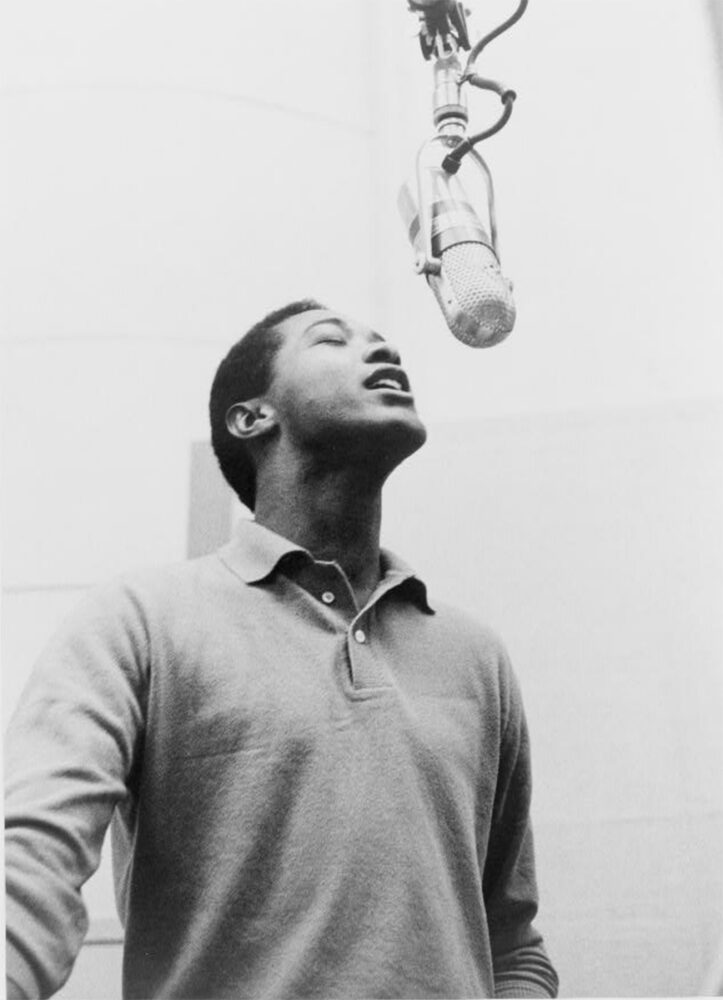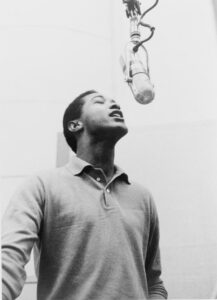“A Change Is Gonna Come”
Sam Cooke wrote the civil rights anthem “A Change Is Gonna Come” after encountering racial discrimination while on tour in Shreveport.

Library of Congress
Sam Cooke recording vocals, 1964.
In 1963, an especially consequential and violent year during the civil rights era, Sam Cooke composed his stirring civil rights anthem, “A Change Is Gonna Come.” A former gospel music star, the African American singer had been a pop and rhythm-and-blues star since his 1957 crossover hit, “You Send Me.” With “A Change is Gonna Come,” Cooke veered from poignant ballads and happy dance hits, creating instead a majestic lament for freedom.
A tumultuous series of events in 1963 preceded Cooke’s composition of “A Change Is Gonna Come,” including police turning fire hoses and dogs on protesting Black youth; the Ku Klux Klan bombing that killed four Black girls as they attended Sunday school in Birmingham, Alabama; and the assassination of civil rights leader Medgar Evers at his home in Jackson, Mississippi.
Racial tension was high in Louisiana, too. In Shreveport police blocked a march in memory of the Birmingham bombing victims. Riot squads, deputies, and a mounted posse attacked more than five-hundred Black churchgoers as they left a memorial service for the girls, and Reverend Harry Blake, president of the local NAACP, was “clubbed to the ground,” the Louisiana Weekly reported.
On the morning of October 8, 1963, Cooke and three members of his touring entourage arrived at the Holiday Inn North in Shreveport. The African American singing star had called the hotel in advance to make reservations for himself and his wife, Barbara. When the desk clerk claimed no rooms were available, Cooke and his brother, Charles, protested angrily. After Cooke’s wife told him his star status couldn’t protect him in the segregated South, the singer and his companions drove away in their two vehicles. As they left, Cooke continuously blew the horn in his Maserati and all four of the cars’ occupants shouted and cursed.
The Holiday Inn manager complained to the police, and Cooke and the others were arrested at the Black-owned Castle Hotel. Charged with causing a public disturbance, they were released in the afternoon after paying a cash bond of $102.50 each. That evening, a bomb threat nearly stopped Cooke’s show at Shreveport’s Municipal Auditorium. The Holiday Inn incident was front page news that afternoon in the Shreveport Journal with the headline, “Negro Singer Arrested Here.” Wire service stories about the arrest ran in newspapers across the nation.
The Shreveport incident happened during a southern tour that followed by a matter of weeks Martin Luther King Jr.’s momentous “I Have a Dream” speech in Washington, DC. Speaking at the Lincoln Memorial on August 28, 1963, the civil rights leader told his audience of 250,000 that fulfillment of the promise made a century before by the Emancipation Proclamation was long overdue. “We can never be satisfied,” King said, “as long as our bodies, heavy with the fatigue of travel, cannot gain lodging in the motels of the highway and the hotels of the cities…as long as our children are stripped of their selfhood and robbed of their dignity by signs stating, ‘For Whites Only.’” In Dream Boogie: The Triumph of Sam Cooke, biographer Peter Guralnick writes: “It is impossible to calculate the full effect that watching this on television, listening on the radio must have had on Sam. … This was the world from which he came.”
The prelude to King’s speech included a morning concert. One of the acts, folk trio Peter, Paul, and Mary, sang their current hit, “Blowin’ in the Wind.” Cooke knew Bob Dylan’s original recording of the song. He confided to associates that its message and the fact that a young white man had composed it nearly made him ashamed of himself for not writing a song like it. “I’m going to write something,” he told his business partner J. W. Alexander.
In late 1963 Cooke told confidants that he’d written a song during an almost dreamlike state. Its lyrics juxtapose hope with the world-weary knowledge that justice has been “a long time comin’.” Cooke seemingly based one of its lines on his recent experience in Shreveport: “And I go downtown, and somebody keep telling me, ‘Don’t hang around.’”
Two days before a recording session in late January 1964 at RCA Studio in Hollywood, Cooke asked René Hall to make an orchestral arrangement for “A Change Is Gonna Come.” He gave Hall no guidance, other than to write a suitable arrangement.
Hall, a native of Morgan City, Louisiana, took the assignment to heart. His cinematic orchestration features a plaintive 11-piece string section, dramatic timpani drum, and elegantly melancholic French horn. “I wanted it to be the greatest thing in my [life],” Hall said of the arrangement. “I spent a lot of time, put out a lot of ideas, and then changed them and rearranged them, because he [Cooke] was an artist for whom I’d never done anything with my own concepts, and this was the only tune that I can ever recall where he said, ‘I’m going to leave that up to you.’ ”
On January 30, 1964, Hall conducted the musicians at the “A Change Is Gonna Come” recording session. The players included two other musicians from Louisiana, keyboardist Harold Battiste and drummer Earl Palmer. “A Change Is Gonna Come,” originally released on Cooke’s 1964 album, Ain’t That Good News, became a civil rights anthem. Re-recorded by more than 500 artists, the song was added to the Library of Congress’s National Recording Registry in 2006. In 2013 the Songwriters Hall of Fame gave “A Change Is Gonna Come” its Towering Song Award, an honor presented to composers of songs that profoundly influenced American culture. In 2021 Rolling Stone magazine ranked it number three in the 2021 list of the 500 Greatest Songs of All Time.
